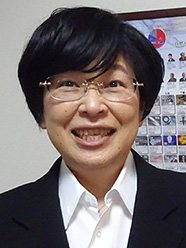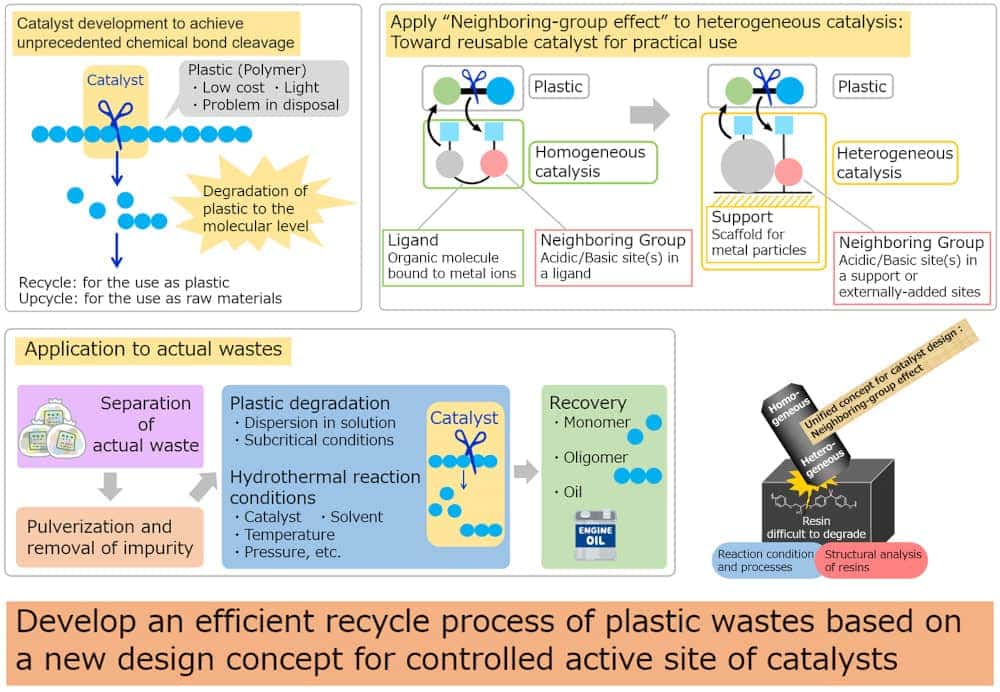Project Overview
Message from Research Director

- Research Director
- Kyoko Nozaki
- Professor, Graduate School of Engineering, The University of Tokyo
Develop an efficient recycle process of plastic wastes based on a new design concept for controlled active site of catalysts
Our modern life is supported by macromolecules made by connecting small molecules using “synthetic chemistry”. Synthetic resin (plastic) thus created has rapidly become widespread. In spite of its enormous benefit, we concurrently face their disposal issues. To tackle this problem, it is indispensable to establish “degradation chemistry” developing reactions and/or catalysts (tools) to disconnect chemical bonds of macromolecules.
In this project, we develop catalysts for degrading plastics for recycling and/or upcycling. We extend concept of “neighboring-group effect in catalysis”, commonly accepted in homogeneous catalysts (molecular catalysts soluble in solution), to heterogeneous catalysts (solids insoluble in solution) widely used in industry. Through this project, we expect to develop a plastic reuse process for solving social issues and to establish a new academic field “degradation chemistry”.
Overview
The modern chemical industry is supported by "synthetic chemistry" that builds new bonds by combining compounds with 2 to 5 carbon atoms and/or aromatic hydrocarbons such as benzene, toluene, and xylene obtained by petroleum refining. Among them, polymers formed by repeatedly binding these simple molecules have rapidly become widespread as synthetic resins (plastics). However, looking at modern chemistry from the perspective of "degradation chemistry", we realize that we have insufficient reactions or catalysts (tools) to disconnect the intermolecular bonds of macromolecules and decompose them into simple small molecules. Now, we should make progress in basic research that responds to the demands of society from the perspective of "degradation chemistry". In recent years, intensive efforts have been devoted to the recycling of plastic wastes. For example, polyalkylene terephthalate, often used as PET bottles, can be subjected to material recycling and monomer recycling by the state of art technology. Polystyrene used in food packaging and polymethylmethacrylate used as organic glass can be decomposed into monomers by heating. On the other hand, there are many persistent plastics for which environmentally friendly recycling methods have not yet been established. For example, thermosetting resins such as epoxy resins and engineering plastics with high heat resistance such as polycarbonate are extremely difficult to decompose. In addition, polyolefin (a general term for polyethylene and polypropylene) which makes up about half of the total plastic production, often used for containers and packaging, is mainly recycled by gasification and oilification. Since this method requires a large amount of energy, energy saving is required from the viewpoint of life cycle assessment (LCA).
Against such a background, this research aims to provide new solutions to the above-mentioned problems from basic science. We will develop catalysts for degrading plastics at the molecular level or for recycling and upcycling (creating new useful raw materials). While development of a heterogeneous catalyst (solid catalyst) that can be recovered and reused is indispensable for social implementation, difficulty in precise structural control of heterogeneous catalysts often prevents them from effective improvement based on understanding of the reaction mechanisms. Here, we focus our attention on the cooperative effect (neighboring-group effect in catalysis) played by the functional group(s) adjacent to the active metal centers in the catalyst. The effect has been attracting attention in recent years in homogeneous catalysts. We propose to expand this concept to heterogeneous catalysts, aiming at the development of well-defined recoverable and reusable catalysts with higher efficiency for plastic degradation.

Research Groups
- - Graduate School of Engineering, The University of Tokyo Group (Kohei Takahashi, Project Lecturer)
- Development of hydrogenated catalysts for hardly degradable resins
- Development of easily decomposable group-introduced polyolefin
- - National Institute of Advanced Industrial Science and Technology Group (Yasunori Minami, Chief Senior Researcher)
- Development of hydrolysis catalysts for hardly degradable resins
- -Hosei University Group (Yuki Yamasaki, Professor)
- Reaction field design
- -Institute of Industrial Science, University of Tokyo Group (Shintaro Nakagawa, Lecturer)
- Evaluation of polymer structure
- -Gunma University Group (Miwa Suzuki, Lecturer)
- Evaluation of biodegradability

